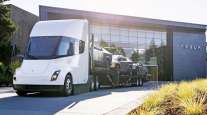Senior Reporter
Daimler’s Nielsen Believes Truck Production, Sales Improving

[Stay on top of transportation news: Get TTNews in your inbox.]
Even though the coronavirus pandemic will lower the production and sale of new trucks in 2020, Daimler Trucks North America CEO Roger Nielsen believes the original equipment manufacturer will reach replacement levels for each by the time 2020 ends.
In a wide-ranging conversation with reporters Aug. 17, Nielsen said the industry was hit hard in March, April and May as the COVID-19 raged. Still, he said that truck production and sales have stabilized.
“We are back building vehicles at the same rate we were before the pandemic hit America. Definitely, it will lower the total volume for the year. July was a relatively good month for retail sales,” he said. “Sales were up to about 27,000 vehicles in July, and if we run 27,000 a month for the rest of the year, which I see no reason why we will not, then the market will run about 310,000 vehicles. It’s not going to be 2019 for sure, but it’s still strong with a lot of replacement demand.”
Putting these [electric] trucks into real applications, running real freight is where we’re gaining the experience we need. What are the fears of the driver? What is his range, anxiety, tolerance, and so on and so forth?
Roger Nielsen, DTNA CEO
Nielsen said recovery of sales has been across the board for Class 6, Class 7 and Class 8.
“Every one of our businesses, from school buses to heavy-duty trucks, has gone through this pandemic and come out of it really strong,” he said.
Nielsen said there’s still a lot of uncertainty in the trucking industry and that he’s telling Daimler officials to focus on the future.
“There’s still a lot of work being done to put new products on the road, new innovations coming out. We have upcoming product launches, and we’re working with partners and developing new partnerships to continue to grow and innovate in our business,” he said.
Nielsen said Daimler is focusing much of its research and development on bringing more electric-truck technology to the marketplace.
“We have our team on the road making sure these trucks get deployed properly,” he said. “They’re making sure the drivers get trained, service techs are trained. We’re proud of what they’ve done globally. We now have about 2 million kilometers (1.2 million miles) of cumulative battery-electric miles. With the commonality we have across the different platforms, it’s been great to be able to gain from their experiences.”

The DTNA Freightliner eCascadia electric truck on display in 2019. Nielsen said the company is focusing on bringing more electric-truck technology to the marketplace. (Daimler Trucks North America)
Nielsen told reporters making a successful transition to electric trucks will depend in large part on the reaction the vehicles get from drivers, mechanics and trucking company officials, who will spend countless hours in them, and then give the company important feedback.
“Putting these trucks into real applications, running real freight is where we’re gaining the experience we need. What are the fears of the driver? What is his range, anxiety, tolerance, and so on and so forth? All those things that you can’t get with a professional test driver, we’re gaining that type of knowledge,” he said. “What they need is a business partner who knows them, who’s going to support them, and who’s going to help keep them running at the lowest possible cost.”
Proponents of electric trucks say the key to having them become more viable in the marketplace will come down to the speed of charging and extending the vehicle’s overall range.

Natural gas and propane join electric power as alternatives to diesel. Host Seth Clevenger talks with Chad Lindholm of Clean Energy and Stuart Weidie of Alliance Autogas. Hear a snippet, above, and get the full program by going to RoadSigns.TTNews.com.
Nielsen said most of the initial truck charging infrastructure that will be needed to bring electric trucks to the forefront will begin with a network of depot charging stations and expand from there.
“It’s a bridge too far to believe that implementation of a battery-electric vehicle fleet and the public infrastructure will come along at the same speed,” he said. “We believe that depot charging is going to be the way we need to provide energy to our vehicles as we get started.”
In 2019, Daimler introduced what it calls its Dynamic Leasing Program, which enables pay-as-you-drive financing to match lease payments to billable miles. The program debuted this year, focusing on the Freightliner Cascadia.
Nielsen said that could be a direction the company takes in the future with electric trucks as those vehicles become mainstream.
“We’re trying to get deep into their cost-per-mile calculations to make sure that when they do make the commitment, that we can make that commitment at a point where we have full transparency on what the costs are,” he said.
Want more news? Listen to today's daily briefing:
Subscribe: Apple Podcasts | Spotify | Amazon Alexa | Google Assistant | More





